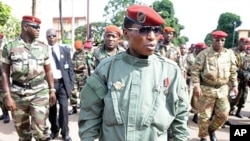A leading member of Guinea’s opposition coalition says the group is concerned the tense political situation could worsen if the recovering junta leader, Captain Moussa Dadis Camara returns to Guinea after his medical treatment in Morocco.
Abe Sylla said the junta leader should step aside as efforts are made to return the country to democracy.
“As far as we are concerned Camara should be out of the picture for two reasons: number one right now he is disabled due to the fact (that) he has a bullet in his head and he is in a recovery mode and you had the result of the inquiry from the international community specifically (the) United Nations that had found him involved in the massacre of September 28th,” he said.
Captain Dadis Camara was flown to Morocco for medical treatment shortly after he was shot by the former head of the presidential bodyguard, Lieutenant Abubakar Toumba Diakite.
Sylla said the opposition will continue the fight for democracy.
“The opposition they are waiting for him (Camara) if he ever returns then you know we are going to have the people in the streets and we are going to confront these guys again. I don’t think that is good for the country at this point. What we should be talking at this point is how we can put a transitional government to lead us into a free and fair election so that the country can return to democratic rule,” Sylla said.
The military government has reportedly banned all forms of pro-democracy protests after soldiers shot dead unarmed opposition protesters.
Sylla said the opposition is concerned the country could be plunged into a civil war.
“The scary part of this is (that) if nothing is done… if this game goes on for long it may change into a civil war, and if that happens, I mean this country will be like Somalia. There may be hundreds of warlords roaming around. At this point, I don’t think it is prudent for him (Camara) to return,” Sylla said.
A recent United Nations report found junta leader Captain Camara directly responsible for the massacre of at least 150 pro-democracy demonstrators in September.






